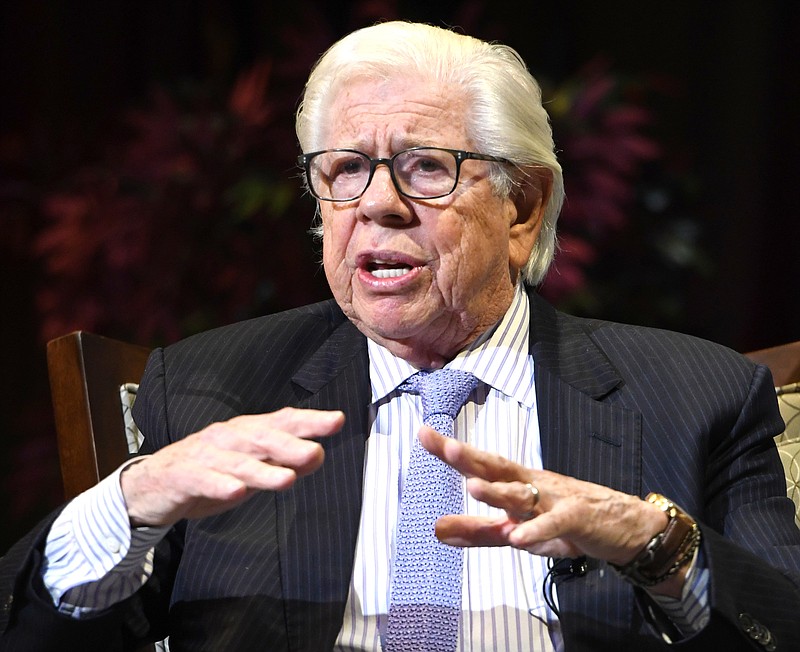The liberal icon sat under bright lights, his clothes slightly rumpled as they always were when he reported on the story that made his career. But his New Balance sneakers -- a testament, he said, to his age (78) -- were shiny, white and pristine.
Carl Bernstein was on a stage in the Iles Physical Education Center for the inaugural R. Lynn Sauls Lecture Series at Southern Adventist University in Collegedale Thursday night because the reporting he and Washington Post colleague Bob Woodward did led to the Watergate scandal-related resignation of President Richard Nixon in 1974.
Or, as he rightly said, "Nixon brought himself down."
Bernstein gave those who came to hear him excoriate the Nixon that liberals loved to hate all they wanted and was happy to throw in plenty of invective for former President Donald Trump, whose deeds he said were "beyond that of Nixon."
But the former Post reporter had a few other things to say about the national media of which he was and is a part. And, though he had some pointed things to say about conservative Fox News, he made it clear his words covered all media, those considered right of center and those considered left of center.
Bernstein started his newspaper career at the age of 16 after his father made a call to a friend at the Washington Star because his son had "one foot in the pool hall, one foot in juvenile hall and a toe in school." Many may be surprised to learn Bernstein also is a college dropout. And though he didn't say specifically, he intimated his kind wasn't likely to find work at papers like the Post or the New York Times today.
"There are too many in Washington [media] who come from the coasts -- from big schools," he said. "We need people from all over the country. A lot of people believe only the elite are in media. I think there's something to that."
Bernstein, in answering a question about advice for his younger self, told a story he said Woodward employs frequently on words of wisdom then-Washington Post owner Katherine Graham told the pair after Nixon's resignation.
"Beware the demon pomposity," she said.
"There have been moments," Bernstein admitted, "where we didn't meet that standard. The press could use a lot more humility."
Bernstein had opened his lecture titled "Why Truth Still Matters"-- more of a conversation with Alison Lebovitz, host of WTCI's "The A List" -- with his description of reporting as "the best obtainable version of the truth."
Reporters today, he said, are "dominated by laziness," not the perseverance he said he and Woodward used in reporting on Watergate -- and, thus, "do not have the best obtainable truth." Sometimes, he said, that "requires saying we don't have the story."
Our example of that, not his, would be in the 2017-2019 media reporting that all but found Trump guilty of collusion and obstruction in the investigation of Russian influence in the 2016 presidential election.
"It's a problem in mainstream news," Bernstein said.
The author and political commentator, in dispensing advice for young journalists, said members of the national media are "terrible at covering the people of the country."
Instead of getting out and determining what people actually think, he said, they stick to their preconceived ideas.
Bernstein also opined that "most reporters are lousy listeners" and too often want to report only "manufactured controversy."
As an example, he said a Washington reporter might go to Republican U.S. Senate leader Mitch McConnell and ask him what he thought about what Democratic Senate leader Chuck Schumer said about a piece of legislation, and then go to Schumer and ask him what he thought about what McConnell said about the legislation.
"That's not the story," Bernstein said. The story, he said, is "what does the vote [on the legislation] really mean."
The Pulitzer Prize winner for his work at the Post on Watergate also touched on social media, the source of "truth" for so many young people today.
Calling it "a different animal than the legitimate press," he termed it "thoughts without any editing, consensus or exercising some judgment" and, ultimately, a vehicle with "no responsibility to the truth."
And as to how the national media can regain the trust Americans once had in it, Bernstein pondered a moment before acknowledging that "people have lost trust" and how the media often "comes in near the bottom" in surveys of institutions in which citizens have trust (an October Gallup poll put the number of Americans with trust in the media to report the news "fully, accurately and fairly" at 34%).
"Attacks will be there," he said, but should we "do it differently, I don't think so."
However, in criticizing the national media, he already had named some cures -- reduce the elite, employ more humility, stop being lazy, listen better, admit you don't have the story and cover the country, not just the coasts.
If media today employ what Bernstein suggested -- and add the dogged pursuit of the truth that he and Woodward used -- trust in media is bound to rise.
